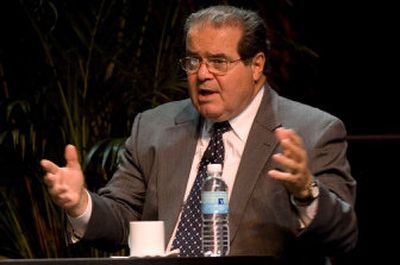Scalia, in ACLU debate, defends abortion stance

WASHINGTON – Justice Antonin Scalia on Sunday defended some of his Supreme Court opinions, arguing that nothing in the Constitution supports abortion rights and the use of race in school admissions.
Scalia, a leading conservative voice on the high court, sparred in a one-hour televised debate with American Civil Liberties Union president Nadine Strossen. He said unelected judges have no place deciding politically charged questions when the Constitution is silent on those issues.
Arguing that liberal judges in the past improperly established new political rights such as abortion, Scalia warned, “Someday, you’re going to get a very conservative Supreme Court and regret that approach.”
“On controversial issues on stuff like homosexual rights, abortion, we debate with each other and persuade each other and vote on it either through representatives or a constitutional amendment,” the Reagan appointee said.
“Whether it’s good or bad is not my job. My job is simply to say if those things you find desirable are contained in the Constitution,” he said.
Strossen countered that such a legal approach would have barred the landmark 1954 ruling in Brown v. Board of Education, a unanimous decision outlawing racial segregation in public schools.
“There are some rights that are so fundamental that no majority can take them away from any minority, no matter how small or unpopular that minority might be,” she said. “And who is better positioned to represent and defend and be the ultimate backstop for rights of individuals and minorities than those who are not directly accountable in the electoral process – namely federal judges?”
The ACLU debate comes as the Supreme Court this term will hear closely divided issues involving partial-birth abortion and school integration. They are expected to test the conservative impact of the court’s two newest members, Chief Justice John Roberts and Samuel Alito.
Scalia, 70, has consistently voted to limit the use of race in school admissions and has called for the 1973 Roe v. Wade decision establishing a woman’s right to abortion to be overruled.
During Sunday’s debate, Scalia outlined his judicial philosophy of interpreting the Constitution according to its text, as understood at the time it was adopted. He reiterated that race has no place in school admissions, a viewpoint that put him on the losing side in 2003.
Scalia generally finds himself taking the opposite position to the ACLU. Most notably, he wrote a majority 5-4 opinion last term giving police more leeway to enter private homes.
But during Sunday’s debate, Scalia noted there were cases in which he and the ACLU agreed. They included rulings upholding flag burning and a 2004 opinion arguing that a U.S. citizen seized in Afghanistan in wartime could challenge his detention as an enemy combatant in U.S. courts.
Strossen, who enjoys a friendly relationship with Scalia despite their differences, applauded those opinions but added, “I don’t want you to think you’re too popular with this group.”
“I’m very distressed about your failure to find protections in the Constitution for the right of consenting individuals in their homes to decide what they see and read, and what type of sexual relations they have,” she said as hundreds of ACLU audience members cheered.